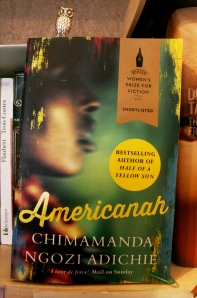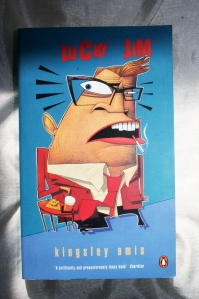Adichie’s third novel traces the younger years of two intelligent Nigerians, Ifemelu and Obinze, and their transformation into adults facing stark questions about race, cultural identity and social difference in their adventures abroad. The novel begins in America, with Ifemelu, at this point a writer of what is referred to as a ‘lifestyle blog’, living with her new American partner Blaine. At this point, Obinze is in Lagos, ‘sitting in the back of his Range Rover’ reading an e-mail from Ifemelu. The opening couple of chapters introduce the reader to the pair’s former relationship and makes you aware of a wistful nostalgia each of them has for their old lives together. Adichie then zips back to their adolescence to describe their Nigerian upbringing, full of fried plantain and hope for the future, of the flowering of their intimacy and finally the fragmentation of their relationship as Ifemelu moves to the United States to study, leading to a progressive break-down in communication. The narrative splits here, on the one hand offering Ifemelu’s perspective as a young Nigerian in America and the difficulties of that experience, and on the other giving the perspective of Obinze who winds up in London, living an undocumented, dangerous and quintessentially immigrant lifestyle in the British capital. While Obinze is soiled and deported back to Nigeria, Ifemelu remains in America struggling to piece together her own cultural identity with an inherently prejudiced American society, as described through the anecdotes that make up her famous blog. Eventually Ifemelu decides to head home to her native Nigeria and she is keen to reunite with her former lover who is now rich, married and has a child. He too holds a flame for his teenage sweetheart, but any chance of a Mills and Boon ending seems to be thwarted by the responsibilities and commitments of adult, married life.
Lagos
The plot, as you can see from the above, might appear rather cheesy and a bit clichéd. The novel itself is anything but this. The story seems to act as a platform for Adichie to explore the novel’s themes and concerns. Her characters give her the opportunity to explore Anglophone culture from the standing of an outsider, exposing the problems, peculiarities and ultimately the inherent prejudices of that culture. For many critics Americanah is a novel about race, and race is evidently one of the central themes of Adichie’s work. In America, Ifemelu initially struggles to find work, putatively due to her skin colour, and she goes on to write a provocative blog about race from which she earns a living and gains opportunities to discuss race as a guest speaker in American institutions. Her Aunty Uju, unlike Ifemelu, forces herself to adapt to the rhythms of American life in order to fit it and, ultimately, to survive:
‘At the grocery store, Aunty Uju never bought what she needed; instead she bought what was on sale and made herself need it… And she [Ifemelu] thought, watching her, how the old Aunty Uju would never have worn her hair in such scruffy braids… America had subdued her.’
Aunty Uju’s earlier struggles in America force her to evolve in order to integrate, something she feels she must do because of her race. Another illuminating observation Ifemelu makes concerning race is that Americans seem to overcompensate for their racism. When Ifemelu babysits for her new employer, Kimberly, they flick through a magazine together and Ifemelu notices that Kimberly seems to have a tendency to label each black-skinned figure ‘beautiful’:
‘“Oh, look at this beautiful woman,” and [she] pointed at a plain model in a magazine whose only distinguishing feature was her very dark skin. “Isn’t she just stunning?”
“No, she isn’t.” Ifemelu paused. “You know, you can just say ‘black’. Not every black person is beautiful”.
Kimberly was taken aback, something wordless spread on her face…’ (pp.146-7)
Later, when Ifemelu is struggling to find work, she is inevitably pleased, but also slightly horrified by her boyfriend, Curt’s, ability to ‘make some calls’ and land her a job:
‘“so I know folks in this other bigger place, but the good thing about this one is they’ll get you a work visa and start your green card process”…She felt, in the midst of her gratitude, a small resentment: that Curt could, with a few calls, rearrange the world, have things slide into the spaces that he wanted them to.’ (p.202)
Adichie has an ability time and again to unveil the machinations of racism, ‘that fine-grained mark that culture stamps on people’ (p.178).
Another central theme that is bound-up with race is that of cultural identity. As hinted at above, Ifemelu is deeply concerned with her Nigerian heritage and is disappointed that her Aunty Uju actively changes to fit in with her new surroundings. The narrative is spattered with phrases in Igbo, showing the importance that Adichie/Ifemelu place on language as an integral part of a person’s cultural identity. Indeed when Ifemelu returns to Nigeria in the latter part of the novel, Obinze observes how Ifemelu has not gained an American accent and she explains that she purposely restrained herself from taking on any American inflections. Language, for Ifemelu, is integral to your identity and this is something she no doubt picks up from her father. As she observes in chapter 3:
‘He [Ifemelu’s father] talked often of how he could not go to university because he had to find a job to support his siblings, and how people he was cleverer than in secondary school now had doctorates. His was a formal, elevated English… Even his handwriting was mannered, all curves and flourishes, with a uniform of elegance that looked like something printed. He had scolded Ifemelu as a child for being recalcitrant, mutinous, intransigent, words that made her little actions seem epic and almost prideworthy. But his mannered English bothered her as she got older, because it was his costume, his shield against insecurity… She preferred it when he spoke Igbo; it was the only time he seemed unconscious of his own anxieties.’ (Pp.47-48)
Later, Aunty Uju’s son Dike struggles with his own identity as a Nigerian who has spent the vast majority (if not all?) of his life living in America. He tells Ifemelu that he regrets not speaking Igbo like her and his mother, and it pains Ifemelu to hear of her cousin’s anxieties. In a world of globalisation where many languages are on the brink of extinction, I felt Adichie’s concern with language and identity is a pertinent theme that should be dealt with more urgently in a lot more contemporary novels.
I also thought Adichie’s dealing with new media and contemporary society in literary fiction was expertly done. Having a character who made a living from blogging about race in America was completely original and Adichie’s detailing of the minutiae of her life will have taken some good research that has evidently paid off. Ifemelu is a brilliant creation, smart, zealous and wonderfully honest. The depictions of contemporary England, America and Nigeria are also flawless as far as I can tell. In Obinze’s England there is the dangerous immigrant lifestyle of identity fraud and sham marriages, something that was in the news very recently here. Other than the inherent racism of America (and the UK), I thought the author provided quite winsome and witty observations of American capitalist society, for example when Aunty Uju goes shopping and buys not what she needs, but whatever’s on sale, or Ifemelu’s (I think it was Ifemelu’s!) bewilderment at the whopping choice of cereals at the supermarket when she first arrives. Nigeria, too, with the exponential growth of the economy and the country, the creation of a rich elite and people making a fortune from sectors such as oil was a believable depiction that grappled with the reality of contemporary global change.
I only had two slight reservations with Americanah, the first being Ifemelu’s occasional self-righteousness in regards to her opinions on race. Many of her observations are insightful, intelligent, and always thought-provoking if not controversial. However there were occasions on which she would shoot down other people’s observations or opinions on race simply because she deemed her experience as being the experience of a non-American black in America. She was, at times, too confident and I would have preferred more dialogue on the subject with other characters. Having said that, I don’t think Adichie was trying to create the perfect spokesperson for race with Ifemelu, and this self-righteousness matches her somewhat brilliantly cantankerous, bubbling, passionate character and so I can accept that a character like Ifemelu would have a tinge of self-righteousness about her. My other drawback was what seemed to me the predictability and ease of the ending. In the recent Guardian Books podcast (listen here) Adichie discusses the ending of her novel and she seemed adamant that it would not have this Mills and Boon-esque ending and instead there would be more complications. There is a short section describing how Ifemelu attempts to move on from Obinze by dating another man, being unsatisfied by her interactions with him, but this section is rather short and, for me, there was never any serious doubt that she would, eventually, get back with Obinze. The ending felt a bit rushed for me, and I would have liked Adichie to develop on what was, I think, her intention of having Ifemelu and Obinze deal with a few more complications at the novel’s denouement. How cruel they both are on Obinze’s wife too!
Americanah is an extraordinarily smart book that exposes and explores many poignant contemporary issues with an urgency and concern that they no doubt deserve. Why do we feel so content with the ‘progress’ we have made in regards to race? How important is language to our cultural identity and consciousness, and what would be the consequence if languages do start to die out? What is the effect of migration on our cultural identity and consciousness? What is nationality? She has achieved this in a beautifully written novel with characters who bring the plot to life. I adored Americanah and look forward to reading her previous two novels.
Chimamanda Ngozi Adichie
Thanks for reading and please tell me what you thought of the novel/this review/Adichie’s previous novels/similar novels!








